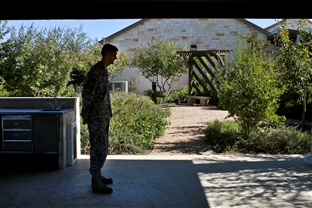
I heard a veteran’s story yesterday. I hear lots of stories from many veterans; stories that are common to many, but unique to each. Being given the gift this story, the gift of trust, is an unparalleled honor.
Many veterans have been carrying the load of their story for years. Their secret. A heavy weight, burdening their mind, their soul. It doesn’t mean veterans are crazy. It doesn’t mean they’re monsters; far from it. This weight means they’re human, with a human reaction to inhuman events.
What veterans saw, especially in combat, opened their eyes to a world that they wish didn’t exist. What veterans experienced exposed the worst demons of human nature, and sometimes exposed the worst of our own. Why would someone want to share that, to expose that to others? It should be forgotten, buried, left alone in the wilderness to wither and die.
Except that our brains don’t work that way. With traumatic memories especially, the memory doesn’t just fade into the background, like the name of that dude in high school you can’t recall. They tend to linger, growing in shape and mass, and come out in other ways. And are dealt with in other ways; avoiding, in the form of denying they happened. Suppressing them, drowning them in work or alcohol or anything else that will keep us from thinking about them.
And yet the stories remain.
Then there comes a point where enough is enough, keeping it inside isn’t working; it’s still bouncing around inside of our head like a rubber bullet. These aren’t dinner party stories, though; we can’t just come out and tell anyone. They’re not the things we tell around the Thanksgiving table or the neighborhood barbecue. They’re the stories that, if we heard others tell them, we might react with shock or surprise.
But we don’t. Because we’ve been there.
Telling Your Story Isn’t Easy
It wasn’t easy for the veterans to tell me their story yesterday. This isn’t the “the time I was in the military” story, or the story of their deployment…what it meant to them, how it changed them. No, this was a specific story, a moment in time, an event that occurred. These are the stories buried within the stories, like nesting dolls, deeper in and more closely held. We don’t want to tell those stories to others; heck, we don’t even want to tell those stories to ourselves. We often don’t realize that we are avoiding it at all; in a form of Orwellian double-think, we try to forget the memory, then we forget trying to forget. It’s not easy telling the stories in an emotional sense, in that it will make us feel bad; it’s also not easy in the sense that even the effort of recalling the memory takes work. It takes psychological exertion to deliberately choose to move towards telling the story while everything within us is dragging us away from it. Moving towards telling the story is like moving towards the sound of gunfire.
Telling Your Story takes Courage
For that reason, telling the story of one of the worst days of your life takes courage. It’s not weakness to admit that there was a time when you saw something, or did something, that still impacts you today. It’s strength. The military mindset is one of minimizing weaknesses, eliminating threats, getting rid of anything that may get in the way of accomplishing the mission. In many ways, that’s avoiding fear. Avoiding pain. Sucking it up and driving on. Which is extremely effective…until it isn’t. When confronted with any physical obstacle in our service, we moved toward it, not away from it. We can use that same determination to move toward the painful story, rather than avoid it.
It also takes courage to trust someone with the story. As I said, this isn’t dinner table conversation. This isn’t talking about sports or the weather or that person you hooked up with last week. These aren’t precious secrets that we want to keep just to ourselves; these are the stories we want to lock away forever. To share that with someone, to have a space to share that with someone, is often difficult. So difficult, in fact, that we do everything in our power to avoid it.
Telling Your Story Eases the Burden
Just like with any effort, however, the reward is at the end. The feeling you get after a hard workout, or a long effort on an important project. The feeling of relief that comes from finally setting down the rucksack or seeing the finished product. The sense that the effort that it took to get through it was worth it, that there is a benefit to completing it. The same thing happens when we choose to open up, to tell our story in a safe and trusting way. It works. I’ve seen it work; it’s worked for me. When we avoid avoiding, we can approach understanding in a way that isn’t possible if we lock the story inside.
Want to keep up with all of the Head Space and Timing content? Subscribe Here

The Head Space and Timing Blog is supported by the Colorado Veterans Health and Wellness Agency, a 501(c)3 Nonprofit in Colorado Springs, Colorado. The goal of the CVHWA is to provide military culturally competent mental health counseling to veterans and their spouses, regardless of characterization of discharge, time of service, or era of service. Our vision is to assist veterans to identify and remove barriers to their mental, physical, emotional, and behavioral wellness. For questions or inquiries, contact us!


